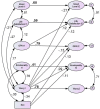Subjective Well-Being, Test Anxiety, Academic Achievement: Testing for Reciprocal Effects
- PMID: 26779096
- PMCID: PMC4705295
- DOI: 10.3389/fpsyg.2015.01994
Subjective Well-Being, Test Anxiety, Academic Achievement: Testing for Reciprocal Effects
Abstract
In the context of adolescents' subjective well-being (SWB), research has recently focused on a number of different school variables. The direction of the relationships between adolescents' SWB, academic achievement, and test anxiety is, however, still open although reciprocal causation has been hypothesized. The present study set out to investigate to what extent SWB, academic achievement, and test anxiety influence each other over time. A sample of N = 290 11th grade students (n = 138 female; age: M = 16.54 years, SD = 0.57) completed measures of SWB and test anxiety in the time span of 1 year. Grade point average (GPA) indicated students' academic achievement. We analyzed the reciprocal relations using cross-lagged structural equation modeling. The model fit was satisfactory for all computed models. Results indicated that the worry component of test anxiety negatively and GPA positively predicted changes in the cognitive component of SWB (life satisfaction). Worry also negatively predicted changes in the affective component of SWB. Moreover, worry negatively predicted changes in students' GPA. Directions for future research and the differential predictive influences of academic achievement and test anxiety on adolescents' SWB are discussed with regard to potential underlying processes.
Keywords: academic achievement; achievement emotions; adolescence; subjective well-being; test anxiety.
Figures
References
-
- Adelman H. S., Taylor L. (2006). School and community collaboration to promote a safe learning environment: state education standard. J. Natl. Assoc. State Boards Educ. 7 38–43.
-
- Akiba M., LeTendre G. K., Scribner J. P. (2007). Teacher quality, opportunity gap, and national achievement in 46 countries. Educ. Res. 36 369–387. 10.3102/0013189X07308739 - DOI
-
- Akinsola E. F., Nwajei A. D. (2013). Test anxiety, depression and academic performance: assessment and management using relaxation and cognitive restructuring techniques. Psychology 4 18–24. 10.4236/psych.2013.46A1003 - DOI
-
- Anglim J., Grant S. (2014). Predicting psychological and subjective well-being from personality: incremental prediction from 30 facets over the Big 5. J. Happiness Stud. 10 1–15. 10.1007/s10902-014-9583-7 - DOI
-
- Aydin M. D., Leblebici D. N., Arslan M., Kilic M., Oktem M. K. (2005). The impact of IQ and EQ on pre-eminent achievement in organizations: implications for the hiring decisions of HRM specialists. Int. J. Hum. Res. Manag. 16 701–719. 10.1080/09585190500082998 - DOI
LinkOut - more resources
Full Text Sources
Other Literature Sources


